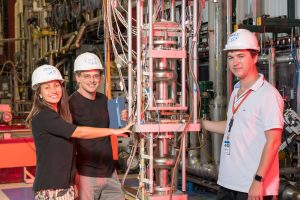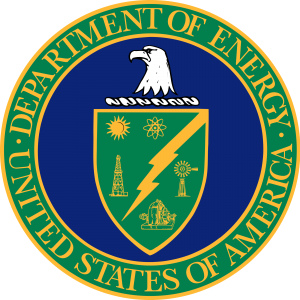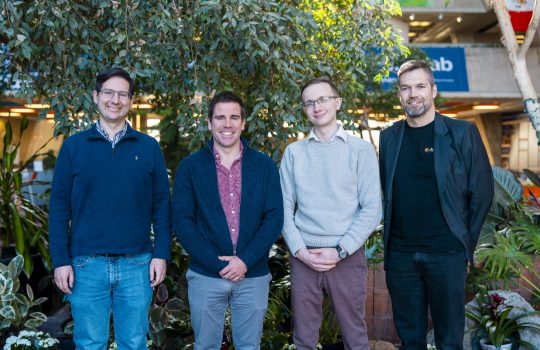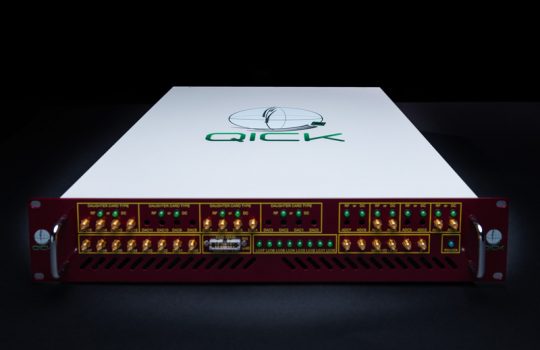Editor’s note: Below is a press release from the White House Office of Science and Technology Policy, the National Science Foundation and the U.S. Department of Energy announcing the establishment of five national centers to bring about transformational advances in quantum information science as a part of the U.S. National Quantum Initiative.
The U.S. Department of Energy’s Fermilab has been selected to lead one of the centers, the new Superconducting Quantum Materials and Systems Center. The initiative provides the center funding with the goal of building and deploying a beyond-state-of-the-art quantum computer based on superconducting technologies. The center also will develop new quantum sensors, which could lead to the discovery of the nature of dark matter and other elusive subatomic particles. Total planned DOE funding for the center is $115 million over five years, with $15 million in fiscal year 2020 dollars and outyear funding contingent on congressional appropriations. SQMS will also receive an additional $8 million in matching contributions from center partners.
“We are thankful and honored to have this unique opportunity to be a national center for advancing quantum science and technology,” said SQMS Director Anna Grassellino of Fermilab. “We have a focused mission: build something revolutionary. This center brings together the right expertise and motivation to accomplish that mission.”
The revolutionary leaps in quantum computing and sensing that SQMS aims for will be enabled by a unique multidisciplinary collaboration that includes 20 partners – national laboratories, academic institutions and industry. The collaboration brings together world-leading expertise in all key aspects: from identifying qubits’ quality limitations at the nanometer scale to fabrication and scale-up capabilities into multiqubit quantum computers to the exploration of new applications enabled by quantum computers and sensors.
The Superconducting Quantum Materials and Systems Center institutions include DOE’s Ames Laboratory, Colorado School of Mines, Fermi National Accelerator Laboratory, Goldman Sachs, Illinois Institute of Technology, the Italian National Institute for Nuclear Physics, Janis Research, Johns Hopkins University, Lockheed Martin, NASA Ames Research Center, National Institute of Standards and Technology, Northwestern University, Rigetti Computing, Stanford University, Temple University, Unitary Fund, University of Arizona, University of Colorado Boulder, University of Illinois at Urbana Champaign and University of Padova, Italy.
“Fermilab is excited to host this National Quantum Information Science Research Center and work with this extraordinary network of collaborators,” said Fermilab Director Nigel Lockyer. “This initiative aligns with Fermilab and its mission. It will help us answer important particle physics questions, and, at the same time, we will contribute to advancements in quantum information science with our strengths in particle accelerator technologies, such as superconducting radio-frequency devices and cryogenics.”
Read more about the Superconducting Quantum Materials and Systems Center.
Reporters: Photos, graphics and videos are available online.
WASHINGTON, D.C. – Today, the White House Office of Science and Technology Policy, the National Science Foundation and the U.S. Department of Energy announced over $1 billion in awards for the establishment of 12 new artificial intelligence and quantum information science research institutes nationwide.
The $1 billion will go towards NSF-led AI Research Institutes and DOE QIS Research Centers over five years, establishing 12 multidisciplinary and multi-institutional national hubs for research and workforce development in these critical emerging technologies. Together, the institutes will spur cutting-edge innovation, support regional economic growth and advance American leadership in these critical industries of the future.
“Today, the Trump administration is making an unprecedented investment to strengthen American leadership in AI and quantum, and to ensure the nation benefits from these emerging technologies. Built upon the uniquely American free-market approach to technological advancement, these institutes will be world-class hubs for accelerating American innovation and building the 21st-century American workforce,” said U.S. Chief Technology Officer Michael Kratsios.
“Thanks to the leadership of President Trump, the United States is accomplishing yet another milestone in our efforts to strengthen research in AI and quantum. We are proud to announce that over $1 billion in funding will be geared towards that research, a defining achievement as we continue to shape and prepare this great nation for excellence in the industries of the future,” said Advisor to the President Ivanka Trump.
“Today’s announcement captures the very best of our nation’s innovation ecosystem. Through these institutes, the federal government, private sector and academia will come together to drive transformative AI and quantum breakthroughs. This is a significant achievement for the American people and the future of emerging technologies,” said Chris Liddell, White House deputy chief of staff.
“The Department of Energy is a staunch supporter of cutting-edge research to advance quantum information science,” said Secretary of Energy Dan Brouillette. “I am proud to lead an agency committed to developing industries of the future by making investments today to accelerate American innovation.”
“NSF’s long history of investment in AI research and workforce development paved the way for many of the breakthrough commercial technologies permeating and driving society today,” said NSF Director Sethuraman Panchanathan. “NSF invests more than $500 million in AI research annually. We are supporting seven NSF-led AI Institutes this year, with more to follow, creating hubs for academia, industry and government to collaborate on profound discoveries and develop new capabilities to advance American competitiveness for decades to come.”
“The Department of Energy is proud to be in partnership with a significant breadth of participants to support Quantum Information Science Centers around the country, and by allocating generous contributions from these participants we can continue to further scientific discovery through quantum technologies,” said Undersecretary for Science Paul Dabbar. “Our nation continues to lead in the development of industries of the future, and these five centers will marshal the full strength of our national laboratories, universities and our public and private sector partnerships.”
NSF-led AI Research Institutes
- The National Science Foundation and additional federal partners, including the U.S. Department of Agriculture, are awarding $140 million for seven NSF-led AI Research Institutes over five years to accelerate a number of AI R&D areas, such as machine-learning, synthetic manufacturing, precision agriculture and forecasting prediction.
- The NSF-led AI Research Institutes will be hosted by universities across the country, including at the University of Oklahoma at Norman, University of Texas at Austin, University of Colorado Boulder, University of Illinois at Urbana-Champaign, University of California at Davis, and the Massachusetts Institute of Technology. Click here for the full list of the NSF-led AI Institutes.
- NSF anticipates additional AI Research Institute awards in the coming years, with more than $300 million in total investment toward these national hubs expected by next summer.
- This builds upon last month’s announcement of $75 million for three new Quantum Leap Challenges Institutes awarded by NSF.

The National Quantum Initiative provides the new Superconducting Quantum Materials and Systems Center funding with the goal of building and deploying a beyond-state-of-the-art quantum computer based on superconducting technologies. The center also will develop new quantum sensors, which could lead to the discovery of the nature of dark matter and other elusive subatomic particles. Photo: Reidar Hahn, Fermilab
DOE Quantum Information Science Research Centers
- To establish the QIS Research Centers, the Department of Energy is awarding $625 million over five years to DOE’s Argonne, Brookhaven, Fermi, Oak Ridge and Lawrence Berkeley national laboratories, subject to appropriations. Each QIS Center incorporates a collaborative research team spanning multiple scientific and engineering disciplines and multiple institutions.
- This award was met with $340 million in contributions from the private sector and academia.
- The centers will focus on a range of key QIS research topics including quantum networking, sensing, computing and materials manufacturing. Click here for the full list of DOE’s QIS centers.
- The National Quantum Initiative Act, bipartisan legislation signed by President Trump in 2018, called for the creation of research centers nationwide to accelerate foundational QIS research and development.
Earlier this year, President Trump committed to doubling investment in AI and QIS research and development over two years. Click here to view the latest report illustrating the administration’s progress in delivering on this request.




